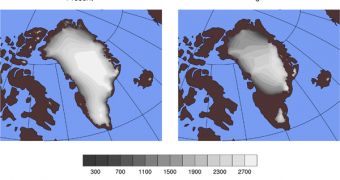Sea levels have risen 10 cm (4 inch) from the beginning of the industrial era, when people started to dump huge amounts of carbon dioxide resulted from the burning of the fossil fuels into the atmosphere.
But what has occurred till now is nothing compared to what is going to happen if only the Greenland's ice sheet melts. In this case, the rise will be of 7 m (23.3 ft).
And imagine that this is just 9 % of the total polar ice. 90 % is stored in Antarctica. "Glaciers on Greenland are now melting most quickly where they are in contact with surrounding ocean, while ice in the high center remains intact," said Garry Clarke, a professor at the University of British Columbia.
But if temperatures keep on growing due to the global warming, raising further the freezing level, the ice loss experienced by Greenland will be greater than that of previous interglacial intervals, hundreds of thousands of years ago. "It would be the complete disappearance of the Greenland ice sheet. We still don't know how quickly our rendezvous with this will occur," said Clarke.
The researchers point to the fact that the Arctic climate models on ice sheets are still not very precise, and most data is delivered by two satellite tracking systems and gravitational physics. "Canada will be the country most impacted by global warming. But the polar cryosphere -- Arctic ice -- is a focus of the entire international scientific community because the potential for sea level rise exists primarily in the polar cryosphere", said the group chair Gordon McBean, a scientist and former federal government deputy minister.
"The researchers' work has a direct impact on predictions of flooding in low-lying countries, and on risk calculations such as how the United Kingdom should rebuild the barrier on the River Thames", said Shawn Marshall, a geographer from the University of Calgary.
Many researchers expressed fear about the recent decision of Canada's federal government that the country will not act to cut off the landmark emissions to decreased targets established by the international Kyoto accord.

 14 DAY TRIAL //
14 DAY TRIAL //